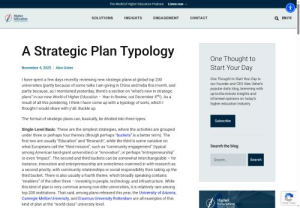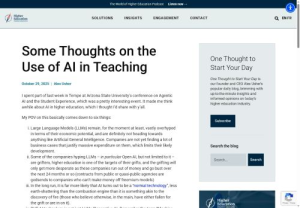Showing bookmarks tagged with: alex usher
Clear
A Strategic Plan Typology | HESA
https://higheredstrategy.com/a-strategic-plan-typology/?utm_source=rss&utm_medium=rss&utm_campaign=a-strategic-plan-typology
Selected text
I have spent a few days recently reviewing new strategic plans at global top 200 universities (partly because of some talks I am giving in China and India this month, and partly because, as I mentioned yesterday, there’s a section on “what’s new in strategic plans” in our new World of Higher Education – Year in Review, out December 4th!). As a result of all this pondering, I think I have come up with a typology of sorts, which I thought I would share with y’all. Buckle up.
The format of strategic plans can, basically, be divided into three types.
Some Thoughts on the Use of AI in Teaching | HESA
https://higheredstrategy.com/some-thoughts-on-the-use-of-ai-in-teaching/?utm_source=rss&utm_medium=rss&utm_campaign=some-thoughts-on-the-use-of-ai-in-teaching
I spent part of last week in Tempe at Arizona State University’s conference on Agentic AI and the Student Experience, which was a pretty interesting event. It made me think awhile about AI in higher education, which I thought I’d share with y’all. My POV on this basically comes down to six things: That last one […]
Selected text
Anyways, long story short: getting good at applying any new technology to pedagogy, AI or no, really comes down to time, resources, a willingness to experiment and a determination to share experiences and promote good practice at scale. The problem most universities have with technology adoption processes isn’t that institutions and/or faculty are anti-technology; it’s that modern universities make very little space available to talk pedagogy or to properly resource experimentation in pedagogy.

